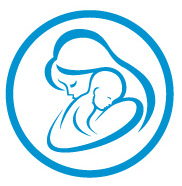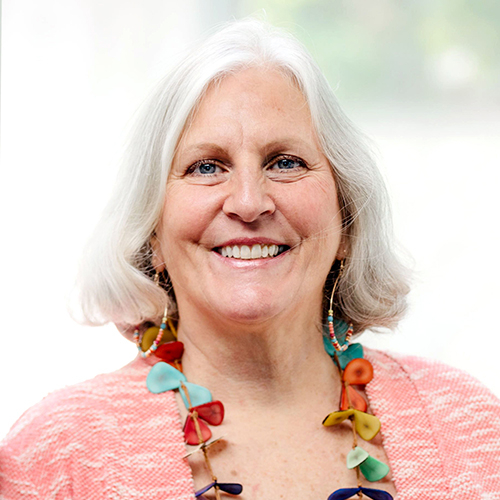
Infant Mental Health Lecture Pack
Sign up to access this informative add-on package that provides focused presentations from experts in the field of infant mental health. Mental health isn't just for adults! Infant mental health refers to the emotional, social and cognitive well-being of infants and young children. Infants are conscious beings and what happens to them in infancy and even in utero can have a lasting impact over their lifetime. Learn about the growing body of research that explains how health care providers can encourage positive mental development starting in infancy."


Dr. Hazelbaker has been a therapist in private practice for over 30 years. She specializes in cross-disciplinary treatment and to that end has taken training in several modalities to best assist her clients. She is a certified Craniosacral Therapist, a Lymph Drainage Therapy practitioner, a Tummy Time™ Trainer, a Haller Method practitioner, A Pre and Perinatal Psychology Educator, a Lactation Therapist Diplomate, an International Board Certified Lactation Consultant and a fellow of the International Lactation Consultant Association.
She earned her Master’s Degree from Pacific Oaks College (Human Development specializing in Human Lactation) and her doctorate from The Union Institute and University (Psychology, specializing in Energetic and Transformational healing.)
People recognize her as an expert on infant sucking issues caused by various structural problems like torticollis, plagiocephaly, brachycephaly and tissue shock-trauma. She invented the Hazelbaker™ FingerFeeder and the Infant Breastfeeding CranioSacral Protocol™ to assist in the resolution of this type of infant sucking dysfunction.
Topic: Cranial Nerves: A Critical Component of the Process of Breastfeeding - [View Abstract]
Topic: Creating Flow: Using Lymphatic Drainage Therapy for Breastfeeding Issues - [View Abstract]
Topic: Finger Feeding: What Do We Know? What Should We Know? - [View Abstract]
Topic: Gamechangers: New studies that will change the way we think about tongue-tie - [View Abstract]
Topic: Infant Trauma: Impact on Breastfeeding - [View Abstract]
Topic: The Faux Tie: When is a "Tongue-tie" NOT a Tongue-tie? - [View Abstract]
Topic: The Impact of Bodywork on Infant Breastfeeding - [View Abstract]
Topic: What Does Torticollis Have to do with Breastfeeding? - [View Abstract]
Objective 1: The participant will be able to define infant trauma. Objective 2: Then participant will be able to list five causes of trauma in utero. Objective 3: The participant will be able to describe the adverse impact of trauma on breastfeeding. Objective 4: The participant will be able to identify three strategies for mitigating infant trauma in the postpartum period.


Kate White is and award-winning craniosacral and massage therapist, prenatal and early childhood educator. She is trained in somatic therapies, prenatal and perinatal health, lactation, brain development, infant mental health, and has specialized in mother-baby dyad care using somatic prevention and trauma healing approaches for nearly 20 years. She is a mother of two children, holds a BA and MA in Communication, is a Registered Craniosacral Therapist in the Biodynamic Craniosacral method and a Somatic Experiencing® Practitioner. Her work combines somatic therapy with brain development to help give families with babies and small children the best possible start. She is Founding Director of Education for the Association for Prenatal and Perinatal Psychology and Health from 2013 – 2018 where she managed a large online educational program for professionals. She currently co-directs this program, administering an online program for parents and parent professionals, runs a private practice and offers her own seminars through the Center for Prenatal and Perinatal Programs, ppncenter.com.
Topic: Best Practices in Prenatal and Perinatal Psychology and Somatic Health for Optimal Birth Outcomes - [View Abstract]
Topic: Integration of the Science of Safety and Resilience into Perinatal Care: A 5 Step Process - [View Abstract]
Topic: The Science of Safety and Trauma Specific Recognition to Improve Birth Outcomes: What Does It Mean for the Midwife? - [View Abstract]
Topic: “It Was Right but so Wrong:” Helping Families Make Sense of Difficult Births with Trauma Sensitive and Prenatal and Perinatal Healing Approaches - [View Abstract]
Objective 1: Define prenatal and perinatal psychology Objective 2: Name one somatic practice and why it is important Objective 3: Cite one example of an application of prenatal and perinatal psychology and health
Have you ever wondered about the baby’s experience of pregnancy, birth and postpartum and whether it affects birth outcomes? We now know that the mother’s experience can influence the baby in many ways. In addition, prenatal development and birth depend upon a sequence that becomes a pattern in the body. Somatic or body therapies to support healing from birth trauma are becoming more prevalent. Come hear about prenatal and perinatal psychology and health, or the exploration of a baby’s experience of conception, pregnancy and birth and how it has lifelong implications. This talk will outline several best practices for clinicians in perinatal settings of all kinds based on this perspective with a focus on education and somatic tools to ensure high prevalence of application. Current research, education and training programs will be cited, and case studies provided as time allows.


Monica Roosa Ordway, PhD, APRN, PNP-BC is an assistant professor at Yale University School of Nursing where she teaches community health in the Graduate Entry Prespecialty into Nursing and Masters programs. Her research interests include the assessment of psychosocial and biological variables that influence early parent-child interactions and the development of the capacity for parental reflective functioning (RF). Her current research is focused on examining sleep, stress, and health among toddlers living with socioeconomic adversity. Her research goals include evaluating programs using a biological-psychosocial profile in order to translate programs for practical and sustainable use within pediatric clinical settings with the aim of mitigating the effects of toxic stress and the development of subsequent risk factors that lead to chronic illnesses. Dr. Ordway is also a pediatric nurse practitioner and board certified lactation consultant with almost 20 years of clinical experience.
Objective 1: Discuss the dynamics of infant and toddler development Objective 2: Identify protective and risk factors for mental health in the family environment Objective 3: Understand the impact of toxic stress on infant mental health Objective 4: Describe early screening and assessment methods
Infant mental health is an interdisciplinary professional field of inquiry, practice and policy, concerned with alleviating suffering and enhancing the social and emotional competence of young children. The focus of this presentation is to highlight the importance of supporting the relationships between infants and toddlers and their primary caregivers to ensure healthy social and emotional development. Considering the increasing understanding of the impact of toxic stress on the lifelong health of very young children, it is critical that we identify methods to buffer the experience of toxic stress on children beginning at the earliest stages of life. Without appropriate regulation from a supportive caregiver, exposure to toxic stress in early childhood can result in wide-ranging physiological disruptions, including alterations in mental health. This presentation will provide an overview of infant and toddler development, the toxic stress literature, and provide important information on how to screen and assess infants (and toddlers) and their families for risk and protective factors that may trigger or buffer the effects of toxic stress.


Dr. Suzanne Zeedyk is a research scientist fascinated by babies’ innate capacity to connect. Since 1993, she has been based at the University of Dundee (Scotland), within the School of Psychology, where she now holds an Honorary Post. In 2011, she stepped away from a full-time academic post in order to establish an independent training enterprise, the aim of which is to help the public understand what science now understands about the importance of emotional connection for human health and happiness. She works internationally with organisations keen to think more deeply about fostering connection, compassion and resilience. In the last 5 years, more than 40,000 people have attended her speaking events. Suzanne’s core aspiration is to strengthen awareness of the decisions we take about caring for our children — because those choices are integrally connected to our vision for the kind of society we wish to build. More information is available on www.suzannezeedyk.com.
Objective 1: Understand that babies arrive already connected to -- emotionally engaged with -- other people. Objective 2: Understand how connection drives brain development -- and why disconnection is distressing for a baby. Objective 3: Reflect on what these scientific discoveries tell us about the nature of our own humanity – and thus what high-quality infant care looks like.
Human infants are born already connected to other people. Over the past 30 years, science has gained a much better understanding of the sophistication of babies’ innate social capacities, including the way that infants’ early emotional experiences drive brain development. Many practitioners remain unaware of these discoveries, despite the implications they hold for delivering high-quality care. This presentation will review these discoveries and reflect on what they tell us about our own humanity. Emotionally healthy individuals and emotionally healthy societies rely on empathy, resilience and trust. These qualities are precisely the ones being wired into the brain in the earliest years of life.


Marti Glenn, PhD, is Clinical Director of Quest Institute, offering professional trainings and intensive retreats to help adults heal adverse childhood experiences and trauma. A pioneering psychotherapist and educator, Marti is founding president of Santa Barbara Graduate Institute, known for its graduate degrees in prenatal and perinatal psychology, somatic psychology and clinical psychology. In her clinical work and trainings, Marti emphasizes the integration of the latest research in behavioral epigenetics, Polyvagal Theory and affective neuroscience with attachment, early development, and trauma. She co-produced the broadcast quality documentary, Trauma, Brain and Relationship: Helping Children Heal with Daniel Siegel and Bruce Perry and has appeared in such documentary films as What Babies Want; What Babies Know; Reducing Infant Mortality and Improving the Health of Babies. She is the recent recipient of the Verny Lifetime Achievement Award in Prenatal and Perinatal Psychology and Health. Marti is a frequent speaker at conferences worldwide.
Objective 1: The 12 Guiding Principles for nurturing human potential, gleaned from decades of research and practice in the field of prenatal and perinatal psychology Objective 2: What makes this period of development -- preconception through the post-natal period – the most sensitive and critical period of development and how to support best outcomes Objective 3: Key fundamentals in applying this research to clinical practice
The latest developments in science, medicine and psychology suggest that the most critical formative period for human development is between pre-conception and baby’s first postnatal year. This is the most “sensitive and critical period” in the establishment of life patterns in all domains: physical, mental, emotional, relational, and spiritual. For over three decades, prenatal and perinatal psychology has been studying our earliest development from pre-conception through birth and bonding. The field’s research and clinical experience have established the fact that our earliest experiences form the foundation of our sense of self, our capacity to relate to others and our resiliency in life. This work has also effectively mapped key nodal points of development that need to be met in order to promote healthy life patterns. This presentation will outline 12 principles from this research and clinical practice that will help guide practitioners in understanding and applying the fundamentals in their work.
Accreditation
CERPs - Continuing Education Recognition Points Applicable to IBCLC Lactation Consultants, Certified Lactation Consultants (CLCs), CBEs, CLE, Doulas & Birth Educators. GOLD Conferences has been designated as a Long Term Provider of CERPs by IBLCE--Approval #CLT114-07. This program is approved for 5 CERPs (1 L-CERP and 4 R-CERPs).
Tags / Categories
(IBCLC) Psychology, Sociology, and Anthropology, Breastfeeding Strategies for the Preterm Infant, Infant Development & Growth, Infant Mental Health, Trauma & Breastfeeding
How much time do I have to view the presentations?
- The viewing time will be specified for each product. When you purchase multiple items in your cart, the viewing time becomes CUMULATIVE. Ex. Lecture 1= 2 weeks and Lecture Pack 2 = 4 Weeks, you will have a total of 6 weeks viewing time for ALL the presentations made in that purchase.
- Time for viewing the talks begins once you purchase the product. For Live Webinars & Symposiums, the viewing period begins from when the live event takes place. Presentations can be accessed 24/7 and can be viewed as many times as you like during the viewing period.
What are bundled lectures?
- Presentations may be available individually or via a bundled package. Bundled lectures are a set of lectures that have been put together based on a specific category or topic. Some lectures will be available in both individual and lecture form, whereas others will be available only via a bundled lecture pack.
Will there be Handouts?
- YES! Each lecture comes with a PDF handout provided by the Speaker.
Some lectures include a Q&A, what does that mean?
- During our online conferences, presentations that occur live are also followed by a short 15 minute Question & Answer Session. The Speaker addresses questions that were posted by Delegates during the presentation. We include the recording of these Q&A Sessions as a bonus for you.
How can I receive a Certificate?
- If this presentation offers a certificate, once you are done viewing the lecture or the lectures within a bundle, submit your attendance record in order to be able to download your certificate. You'll be able to see which credits are offered for the lecture by hovering over the "Credits Available" link within the "Speakers & Topics" tab.
Professionals that selected this package also viewed

|
|

|








